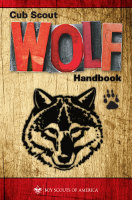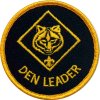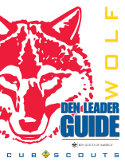Wolf Scouts
This information is out of date.
Use the new Wolf Scout information.

If a Cub Scout has completed the first grade and has earned the Bobcat Badge, the scout may start earning the Wolf rank. The scout receives a Wolf Scout handbook, Wolf neckerchief, and Wolf neckerchief slide when beginning the Wolf portion of the scouting trail. The scout will also need a blue Cub Scout Uniform. This part of the scouting trail is intended to take one school year, preparing the scout to begin earning the Bear rank after completing second grade.
How to Join:
- Go to BeAScout.org
- Click the 'Cub Scouts' tab.
- Enter your zipcode and click the arrow button.
- Click on a Pack near you to see its contact info so you can call the Pack or your local Council about joining.
- Complete a BSA Youth Application and Health Record and give them to the Cubmaster of the Pack you choose.
Your Wolf den will have opportunities to participate in Pack meetings. Prepare your scouts by having them ready to perform a couple of Skits and lead the pack in some Games. By having a Wolf favorite ready, your scouts will look good, have fun, and increase their confidence through leading the pack.
Tip: Choose 2 skits and games before September and do them at your first den meeting. Don't wait until your Cubmaster calls on you for a skit.
Tip: Many packs award the Wolf badge at their Blue-Gold banquet in February. If you begin your Wolf program in September, this means you have less than 5 months to complete the Wolf requirements. You should plan out what requirements your den will do and make a schedule so everyone knows what is expected. A calendar kept up to date helps families keep track of their scouting commitments.
Wolf Advancement
Wolf Scouts do adventures described in their Wolf handbook that advance them towards their Wolf rank. By completing seven adventures, the Wolf rank is earned.
Wolf Rank Requirements:
- Complete each of the six Wolf required adventures:
- In addition to the six required adventures listed previously, complete at least one Wolf elective adventure of your den's or family's choosing from this list: Adventures in Coins, Air of the Wolf, Code of the Wolf, Cubs Who Care, Digging in the Past, Finding Your Way, Germs Alive!, Paws of Skill, Spirit of the Water
- With your parent, guardian, or other caring adult, complete the exercises in the pamphlet entitled How to Protect Your Children From Child Abuse: A Parent's Guide
- Watch the Protect Yourself Rules video for 2nd Grade, Wolf.
(The video is located at https://vimeo.com/325064564 and can be watched on-line or downloaded and viewed off-line.)
OR Earn the Protect Yourself Rules Preview Adventure for Wolf.
Wolf Cub Scouts may also complete either the Protect Yourself Rules or the Yo-Yo Preview Adventure for requirement 2.
If Cub Scouts use the Protect Yourself Rules Adventure in requirement 4, the adventure can not be used as an elective for requirement 2.
Akela is the name given to the Cub Scout's parent or guardian, the caring adult guiding the scout along the Cub Scouting trail. Akela is responsible for acknowledging completion of each adventure requirement by signing and dating the appropriate spot in the Wolf's handbook. There is also a spot for the Wolf Den Leader to sign for each requirement. The Adventure Tracking pages in the back of the Wolf handbook can be used by the Wolf to track progress all in one spot, and some dens use advancement charts or den doodles to publicly display advancement.
A Wolf that has fulfilled all rank requirements still has a lot more adventure waiting. The scout can continue to complete elective adventures with Akela or his den, or at district and council hosted events. Some scouts set a goal to earn the remaining dozen adventure belt loops before moving on to a Bear den.
 Wolf Den Leader:
Wolf Den Leader:
An energetic, organized, and supportive Wolf Den Leader is critical to the success of a Wolf Den. The Den Leader plans the program of activities for the year and makes that plan available to all den parents. The Den Leader should enjoy the outdoors and be a strong advocate for getting youth outside and active.
A well-run Wolf den gives each scout a chance to work on leadership skills in small but meaningful amounts. The Denner position is a great way for individual scouts to practice leadership for a short time. The Den Chief is a Boy Scout that has volunteered to work with a den in order to practice leadership skills and be a role model for younger scouts. The Den Leader is responsible for training and assisting a Den Chief, if the den has been assigned one.
Wolf Den Leader is a registered volunteer BSA position whose responsibilities are:
- Work directly with other den and pack leaders to ensure that their den is an active and successful part of the pack.
- Plan, prepare for, and conduct den meetings with the assistant den leader and den chief.
- Attend pack leaders' meetings.
- Lead the den at the monthly pack meeting and pack activities.
- Ensure the transition of youth in the Wolf den into a Bear den at the end of the year.
- Keep accurate records.
- Help the den earn the National Den Award.

There are many resources available to help the den leader plan and run a successful, interesting program for the scouts. The Wolf Den Leader Guide is the most important one. It has complete den meeting plans for each adventure and many ideas for activities that promote the purposes of Cub Scouting. This guide takes much of the planning burden off over-extended volunteers.
Tip: Remember that the Cub Scout motto of Do Your Best is central to the program. There is no level of competence or skill required to complete adventures. Putting in personal effort and having fun with fellow scouts is success.
As the Tiger program was completely family oriented, so the Wolf program relies heavily on family involvement. You will see this gradually change with the scout doing more with the den and more individual direction as the scout reaches Webelos and Boy Scouts.
Tip: Many available Awards go unused, especially by Wolf and Bear dens. Learn about additional awards offered to your scouts such as the World Conservation Award and Outdoor Ethics Award and consider working them into your schedule - especially in the spring and summer months.
This information is intended to make wolf cub scout dens more productive and interesting for the scouts. A cub scout at the wolf level needs a lot of activity made up of short, interesting games, projects, and challenges.
Click one to vote:
Scouting 2025 - Ask a Question - Add Content
Just for Fun: Socializing merit badge




Find more Scouting Resources at www.BoyScoutTrail.com


Follow Me, Scouts
Recent Comments